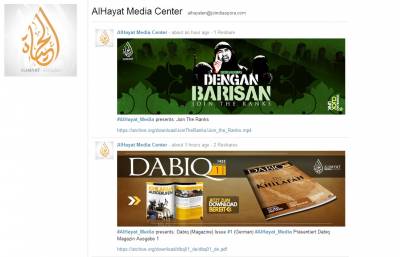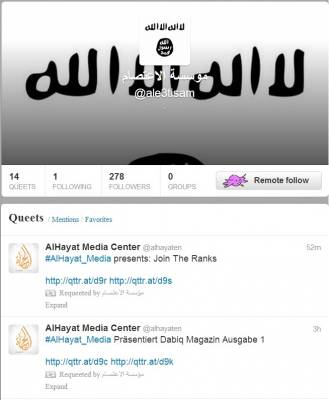Islamic State Tries Diaspora and Quitter as Social Media Alternatives

UPDATE: Both al-'Itisaam Foundation and al-Hayat Media Center’s accounts have been taken off of Quitter. Remaining on both pages is a world peace-promoting artwork, quote by Mahatma Gandhi, and link to ebooks by the figure.
UPDATE: As of August 20, 2014, all Islamic State accounts on Diaspora have also been taken down.
Immediately after all the groups’ pages were kicked off of the Friendica social media platform, Islamic State (IS) media arms have made yet another social media leap—this time into the Diaspora and Quitter platforms.
News of the al-'Itisaam Foundation and al-Hayat Media Center’s new profiles on these sites, which serve as alternatives to Facebook and Twitter, began circulating among jihadist Twitter accounts and forums on July 22.
On this date, user "Abu Yahya al-Muhajir" made an announcement post on the pro-IS al-Platform Media forum. The post reads, “New accounts of the Islamic State,” followed by links to al-Hayat and al-‘Itisaam’s new pages.
More, on the same day, an Arabic-language Twitter account translating to “Sword of the State” tweeted about the new page:
O brothers, make an account in this website and follow al-'Itisaam Foundation in it and this is a photo for the website very similar to Twitter.
The tweet also provided links to the pages along with a screenshot of the Quitter page.
Quitter is a simplified alternative social media platform to Twitter, and claims to have existed since 2010 as “a federation of microbloggers who care about ethics and solidarity and want to quit the centralised capitalist services.” The site exists under Swedish internet domain (.se). Along with its nearly identical appearance, the al-‘Itisaam and al-Hayat Quitter pages serve all of the same basic functions as their Twitter pages—enabling 140-character “queets,” user mentioning, and hashtags.
Diaspora is a user-owned social networking platform that serves as an alternative to Facebook, promising to respect “users' privacy and helps them to own their data” by allowing the option for them to host data on their own, personal servers amid a larger, decentralized network of servers. The interface does not resemble Facebook the same way that Quitter does to Twitter. However, the barren and simplified interface nonetheless allows al-'Itisaam and al-Hayat to post material, share material from other pages, and house comments from followers.

Content posted on these pages mirror that of the groups’ other respective pages—al-Hayat posting English propaganda geared toward Westerners including videos, fighter profiles, and installments of their “Mujatweets” series, while al-‘Itisaam posts links to speeches and Islamic chantings along with reposts of al-Hayat material.

Postings on these pages only go back as far as July 20, the day the pages were taken down from Friendica.
Despite being publicized for less than 12 hours, the groups’ pages have received much support on Twitter and seem to be forming a following, with al-'Itisaam having over 270 followers on Quitter and al-Hayat with over 140. The media groups’ Diaspora followings, however, are harder to quantify as such information is not publicly listed and their current Diaspora “pod” (server) is no longer allowing for sign-ups.
Interestingly, al-Hayat’s seventh episode of its “Mujatweet” series was published on its Quitter and Diaspora pages on July 21 before any of its other channels, suggesting a committed investment in these platforms.
Whether or not these websites will serve as a safe haven from the constant page take-downs on larger-scale platforms like Facebook and Twitter remains to be seen. One should note, though, that it was these pages’ promotion on Twitter that generated the bulk of their followings. Furthermore, as pro-IS Twitter users mobilize others to create accounts on Quitter and to show their support for IS, they assure them that Quitter is “very similar to Twitter.” Such an appeal acknowledges the comfort that IS supporters—not to mention most social media users—have with Twitter. Looking at these factors, it seems that while groups like al-'Itisaam and al-Hayat may dabble in alternative social media outlets, Twitter still remains their priority in outreach and recruitment.